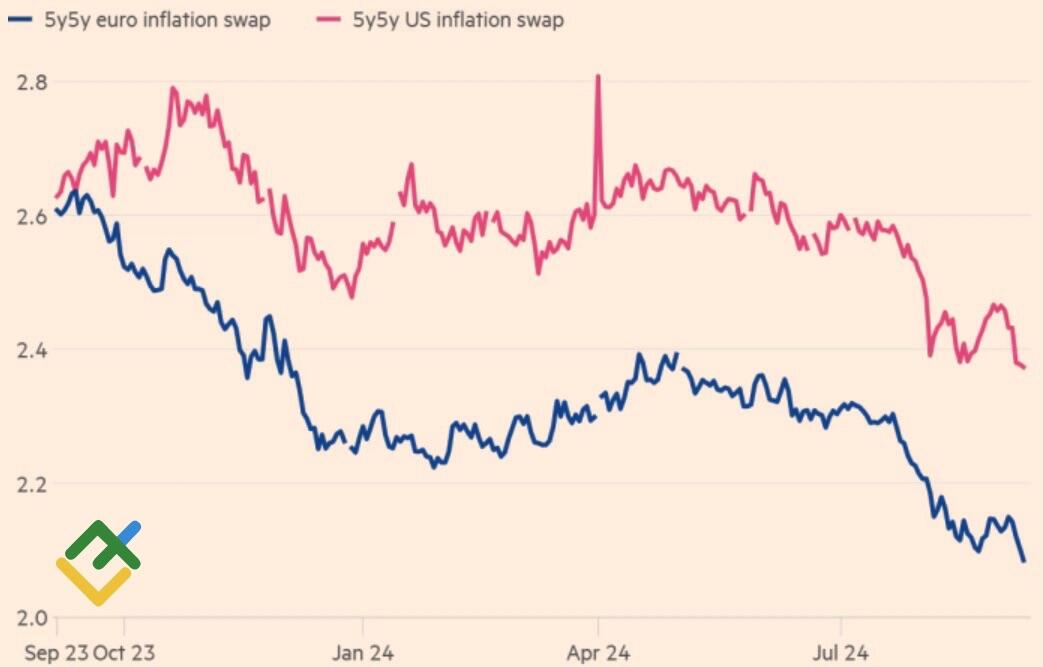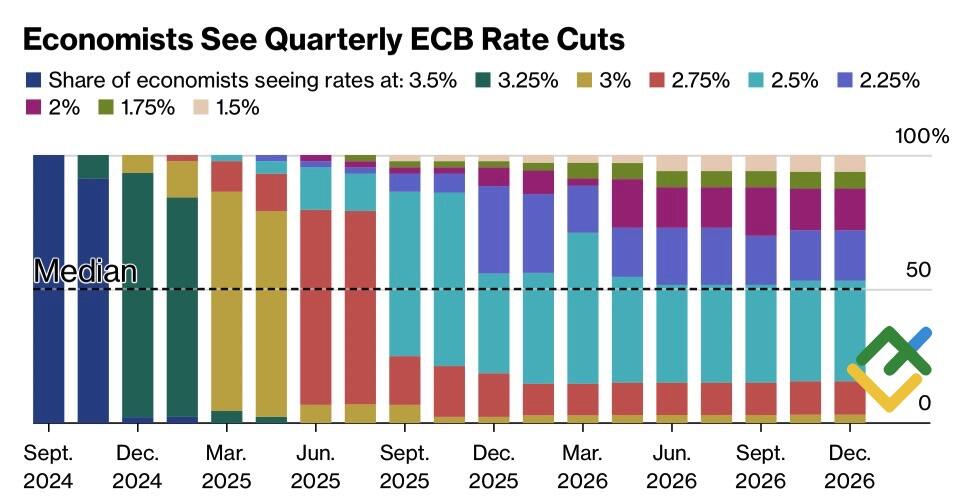
In addition to the release of US inflation data and the ECB’s deposit rate decision, markets will be monitoring the Donald Trump and Kamala Harris debate. Political developments have an impact on the economy and the EURUSD exchange rate. Let’s discuss this topic and make a trading plan.
The article covers the following subjects:
Highlights and key points
- The US and the eurozone are at risk of deflation.
- The Fed and the ECB need to be more aggressive.
- A Republican victory in the debate can return the Trump trade factor.
- The EURUSD may consolidate in the 1.1-1.1015 area.
Weekly US dollar fundamental forecast
Monetary policy is primarily driven by economic data. However, it is the central banks that make the decisions, regardless of the statistics. Despite the reduced likelihood of a half-point reduction in the federal funds rate in September, from 50% to 29%, the Fed may still adopt an aggressive approach at the outset of the monetary expansion cycle. It would not be unexpected if EURUSD bears will shift their stance to a more cautious one in the coming days.
The Fed has been too slow to raise interest rates, which has led to an acceleration in inflation. If the US regulator continues to beat around the bush, the PCE will likely fall below the target level and remain there. Deflation is a more challenging economic condition to address than inflation, as evidenced by the prolonged effects of quantitative easing and ultra-low interest rates. A lack of aggressiveness at the start can lead to complications, as evidenced by historical precedent. Since 1987, the central bank has reduced the federal funds rate by 250 basis points or more on four occasions. All of the aforementioned instances were associated with rapid price increases. Three cases resulted in personal consumption expenditure indices falling below 2%.
The US is at risk of slipping into deflation, as indicated by the sharp decline in inflation expectations, falling commodity prices, and slowing average wages. Should the August CPI growth rate slide below the anticipated 2.6%, the probability of a 50 bp cut in the Fed funds rate in September will increase. This will provide an opportunity for EURUSD bulls to become more active in the market.
US inflation expectations
Source: Financial Times.
Conversely, the euro may be pressured by the dovish rhetoric of the ECB. The market is anticipating a reduction in the deposit rate to 3.5% from 3.75% in September, followed by a pause in November, with the monetary expansion cycle resuming in December. However, in the context of subdued economic expansion, the eurozone is at risk of falling into deflation at a faster rate than the US. Frankfurt would be well advised to adopt a proactive stance.
ECB deposit rate expectations
Source: Bloomberg.
If US inflation is identified as a risk factor for the US dollar and the ECB meeting is a factor for the euro, then the presidential debate on September 10 has the potential to have a significant impact on the markets. Donald Trump will criticize the Democrats for high inflation, while Kamala Harris will target her opponent for imposing a tax on the American consumer in the form of tariffs on imports. The latest New York Times-Siena College poll shows the 45th president ahead of the vice president by one percentage point. This raises the question of whether Harris’ honeymoon is over. She will need to work hard to avoid being labeled as incompetent, as Joe Biden has been.
Weekly EURUSD trading plan
The Democrats’ defeat at the debate is likely to result in a resumption of the Trump trade, which is favorable for the US dollar. The victory is likely to support the euro as a procyclical currency. Overall, the EURUSD pair may consolidate near 1.1-1.1015. Conversely, if the price drops below this area quickly, it may fall to 1.0965. Against this backdrop, consider short trades.
Price chart of EURUSD in real time mode
The content of this article reflects the author’s opinion and does not necessarily reflect the official position of LiteFinance. The material published on this page is provided for informational purposes only and should not be considered as the provision of investment advice for the purposes of Directive 2004/39/EC.
{{value}} ( {{count}} {{title}} )
This post is originally published on LITEFINANCE.







